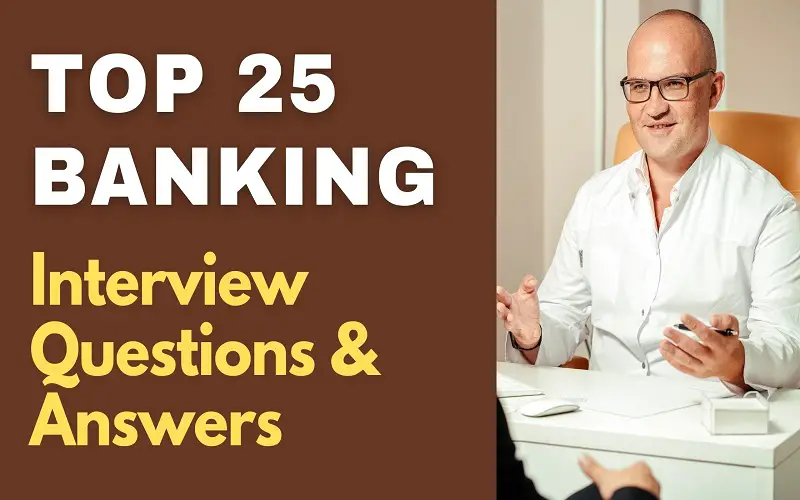Banking is a relatively old yet lucrative career. If you are aiming at a given banking position, this is the best article for you. We will look at some of the common questions you should expect in a banking Interview to increase your chances of landing the job.
1. What Made You Pursue a Career in this Field?
I grew up in a family of bankers. My dad worked on Wall Street while my mother was a bank manager. I was therefore exposed to lots of banking basics at a relatively young age that saw me decide to pursue it when I came of age. I also loved Mathematics and numbers throughout my school life and automatically knew that I would follow my parent’s paths. I pursued a Bachelor in Finance Administration and got a public accountant certification shortly afterward, which prepared me for the banking industry.
2. What are Some of the Qualities that Every Banking Professional Should Have?
There are essential banking skills that every banking professional should have. However, first, they should be excellent problem solvers and analysts, qualities that come in handy in lots of bank processes. A good banking professional should also be attentive to details and possesses excellent communication and team coordination skills. Other qualities include a positive attitude and an attractive personality for dealing with clients, effective time management and multitasking skills, creativity and initiative, excellent leadership skills, creative skills, and numerical literacy. All these are necessary when dealing with customers and bank processes.
3. What Excites You Most about the Banking Environment?
I love dealing with numbers and solving problems, which the banking industry guarantees. It is worth mentioning that one of the reasons why I decided to be a banking professional was my love for numbers. I am therefore satisfied whenever I sit behind my desk attending to customers and balancing accounts. I also enjoy meeting new people and extending great customer service. This is possible in this institution since we serve thousands of customers monthly. Joining this industry is definitely one of the best decisions I have made in my life.
4. What Do You Love Most about this Bank?
What’s not to like about this institution? First, I love your customer base. You target startups, small businesses, and the self-employed, sectors that have been ignored for a long time. Your bank, therefore, ensures that those not in the mainstream can achieve their dreams. I also love your workplace policies and processes. I have had the opportunity to talk to some of your current and former employees whose remarks are positively overwhelming. Lastly, your institution offers opportunities for career growth that I am currently looking for at the moment. I, therefore, believe that I will fit in well in this organization if given a chance.
5. What Don’t You Like About Working in the Banking Industry?
Even though I enjoy working in this industry, it has its flaws, just like any other sector. First, this field requires one to be at their best always regardless of what they are going through in life at the moment. You have to be attentive to details and willing to give your all at any time despite what life throws your way. Lastly, however small in this industry, every problem has huge repercussions.
6. What Would You Do if You Found a Coworker Cooking Figures or Stealing From the Bank?
I am a great believer in honesty and workplace integrity. Everyone should follow all the laid down policies and bank rules. In such an instance, I will deal with the colleague as provided for by the policies. I will raise the alarm to the proper authority for disciplinary purposes. Even though the banking industry requires me to work with my colleagues, I cannot willingly be a party to theft. I won’t, therefore, shy away from notifying the proper authorities.
7. What Do You Believe is the Most Important Skill for a Bank Employee: Customer Service or Sales Skills?
I believe that they are equally important. Sales skills attract and bring in more customers, while customer service skills ensure their continued stay in the organization. These two skills work hand in hand and should all be prioritized upon if possible. Therefore, a good banking professional should be a great salesman and excellent customer care professional. All these are important in ensuring increases and continuous profitability for the bank.
8. Can You Mention Some of the Banking Duties You Have Vast Experience In?
I have spent a significant part of my career as a banker. Therefore, I am experienced in a number of duties, which will help me thrive in this field. I can sign new clients and help them get accustomed to our environment and systems, manage their accounts, including activities such as account opening and transaction oversight, process several deposits, withdrawals, and payments, as well as evaluate and authorize overdrafts and loans. I can also handle different transactions, such as writing money orders and cashier checks when called upon and recommending different products and services based on the needs of different clients. Lastly, I can solve customer complaints and handle different administrative and clerical duties.
9. Do You Know Some of the Requirements in this Industry?
There are several requirements for anybody intending to join the banking industry. First, one must have a bachelor’s degree in finance business administration or a related field. A level of education offers knowledge on the basics of this field, which is essential. Other requirements include extensive understanding of banking services and products, knowledge of banking practices, rules, and different regulations, excellent communication and negotiation skills, and proficiency in a number of tools and software such as Excel, Word, Outlook, and Access. A baking professional should also be able to multitask and manage time excellently.
10. What are Some of the Cautionary Measures a Bank Should Take Before Awarding a Loan to a Customer?
Banks should strive to ensure that only responsible loans are advanced to customers for the purposes of the bank and that of the customer. Therefore, a banking institution must conduct an extensive background check on the borrower before approving any loan. This includes screening for any late payments or loan defaulting by the applicant. The bank should only award safer loans or check for more suitable options for high-risk applicants.
11. Tell Us about the Different Types of Bank Accounts
There are several types of online business account that one can open in a banking institution. However, the most common is the standard checking account, which permits customers or holders to deposit, withdraw, and access their money anytime. They mostly attract no interest. Another popular type is the savings account which attracts a high-interest rate but does not permit round-the-clock access to the money saved. There also exist reserve or money market accounts that, unlike savings accounts, have no transaction limits. However, they attract a lower interest rate. Lastly, we have the CD account, which attracts the highest interest rates but demands that one retains money for years or a relatively longer duration.
12. How Do You Maintain Confidentiality in Your Work?
I understand the sensitivity of banking documents, records, and transactions. I know that I have to exercise high levels of discretion in my work. First, I normally seek authorization where necessary and ensure that the records, transactions, documents, or retrieved information do not fall into the wrong hands. I normally keep my passwords safe and log out of all banking accounts or sites if I have to leave my desk. I do not discuss banking information with the public or those without enough clearance.
13. Can You Work Well Under Pressure?
With over 15 years of experience in this field, I understand just how stressful the banking industry can be. There are always lots of transactions and due diligence to perform and officiate. The good news is I work well under pressure. I have become used to it that it brings out the best of me. I can handle huge workloads and all the stressful aspects of banking. I normally turn to my prioritization and organization skills during such times for optimum success.
14. How Do You Normally Help a Customer Struggling to Understand a Given Aspect that You are Explaining to Them?
The banking industry has lots of terminologies that regular customers may not be in a position to understand. Therefore, I normally explain things in the simplest way possible unless the customer has high financial literacy levels. I try as much as possible to avoid the jargon and technical terms used in banking and even find more relatable explanations. However, to enable that, I always have to interact with the customer first to know how I can base my conversations.
15. How Has Technology Impacted Banking?
We can’t downplay the effect that technology has had on banking over the years. Nowadays, a client doesn’t have to visit the bank to open a bank account since most institutions have online platforms where customers can perform various actions. Thanks to mobile banking applications, customers are able to update and check their balances and perform an array of needs without coming to the bank. Therefore, technology has made our jobs in the banking industry easier and more satisfying.
16. Can You Mention an Experience Where You Handled a Customer With Utmost Respect?
I am a great believer in customer service. Therefore, I normally handle all customers with the utmost respect. However, I will never forget when I realized that a customer’s accounts were frozen even though he believed that there was an error with the account. To avoid any public embarrassment, I asked him to step aside for further help, after which I mentioned the problem with his accounts. He was glad that I didn’t publicly tell him as he was in the company of friends. We managed to resolve the situation without drawing any attention.
17. How Would You Convince a Customer to Bank With Us?
Having spent a significant part of my life on the customer service desk and the marketing department, I know how to bring in new clients for institutions. To convince a customer that you are the best bank, I will mention all the positive aspects of the bank and include all offers they are likely to enjoy on banking with you. I will take them through some possible bank processes and give them a newsletter to learn more about the bank.
18. Can You Tell Us the Different Types of Commercial Banks?
There are three types of commercial banks, namely public sector banks, private sector banks, and foreign banks. A public sector bank is state-owned, meaning that the government owns a bigger part of the shares. Private sector banks are companies with limited liabilities. Therefore, as the name suggests, they are owned by individuals or private businesses. Lastly, foreign banks are financial institutions operating in foreign countries. They play a big role in the development of the nation.
19. What are The Functions of Commercial Banks?
Commercial banks have both primary and secondary functions. Primarily, they accept deposits, offer loans and create credit. For deposit purposes, these banks have savings, fixed, and current accounts, which have distinct features. As for loans, these banks normally offer cash credit which are advances awarded to individuals and organizations against different securities, and short-term credits, which are normally unsecured. These banks also serve secondary functions such as offering locker facilities to house valuable items, offering foreign exchange services, facilitating the exchange of securities, acting as Agents, and discounting bills of businesses.
20. Mention Some of the Methods of Overdraft Protection
There are different types and methods of overdraft protection that customers can take advantage of. The most common is linking one’s checking account to the deposit account at the same bank. The bank will therefore be able to authorize a transaction covering the overdraft. Secondly, one can request an overdraft protection line of credit from the bank. In simple terms, this is a loan specifically meant to cover any overdraft. Thirdly, you can choose to link your credit card to a checking account. The credit card will then cover any case of an overdraft. Lastly, one can resort to a courtesy overdraft at the bank, allowing debit card purchases and ATM withdrawals without enough funds. However, it is normally costly.
21. What Do You Understand by Debt to Income Ratio? What’s Its Importance?
The debt-to-income ratio compares someone’s monthly debt expenses to their monthly gross income for credit or loan purposes. It is important data as it informs lenders whether you will be comfortable repaying a loan or taking on a new deal. It, therefore, tells how risky it will be to award you a loan or mortgage.
22. Can You Differentiate a Credit Card From a Debit Card?
Even though the purpose of these two cards is to effect payment and withdrawals, debit cards differ from credit cards. The former draws from the funds already deposited in your bank account. In contrast, the latter allows you to borrow money up to a given limit for the purposes of effecting purchases or withdrawing cash. These limits normally depend on your repayment to financial ability.
23. Can You Differentiate a Commercial Bank From an Investment Bank?
Commercial banks differ from investment banks based on their services, scope, and intended customers or client base. Commercial banks normally take deposits, award loans, safeguard assets and generally work with any type of client, including the public. In contrast, investment banks only offer services to governments, large corporations, and investors. Investment banks, therefore, only have hundreds of clients, whereas commercial banks serve millions.
24. What is Your Greatest Strength
I have several strengths that have seen me reach this far in my career. However, I believe the greatest is my ability to work in team settings. I am a team player, which has seen me collaborate with other employees and different teams on several projects and general office work. I know how to rally others toward a common goal and ensure that my team members are comfortable and motivated. Apart from my team playing abilities, I am hardworking and diligent. I am also highly organized and able to prioritize work. I am positive that all these will come in handy once I get this job.
25. What is Your Greatest Weakness?
I believe that all humans have flaws, and I am no exception. My greatest weakness is my reluctance to ask for help. I normally seek assistance at the last stage or when overwhelmed, a poor trait that I have held on to for a long time. However, I decided to work on it a few months ago and have since joined many professional help groups. I can assure you that it won’t be a problem once I get this job.
Conclusion
These 20 recommendations are some of the few questions you should expect in your upcoming interview. Do not forget to work on your first impression, nonverbal cues, and general appearance even as you go through them.




